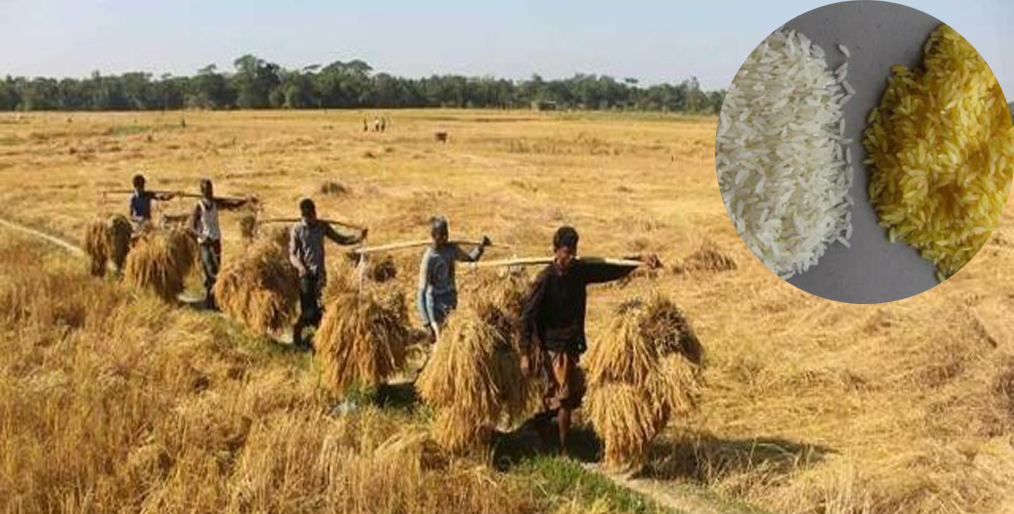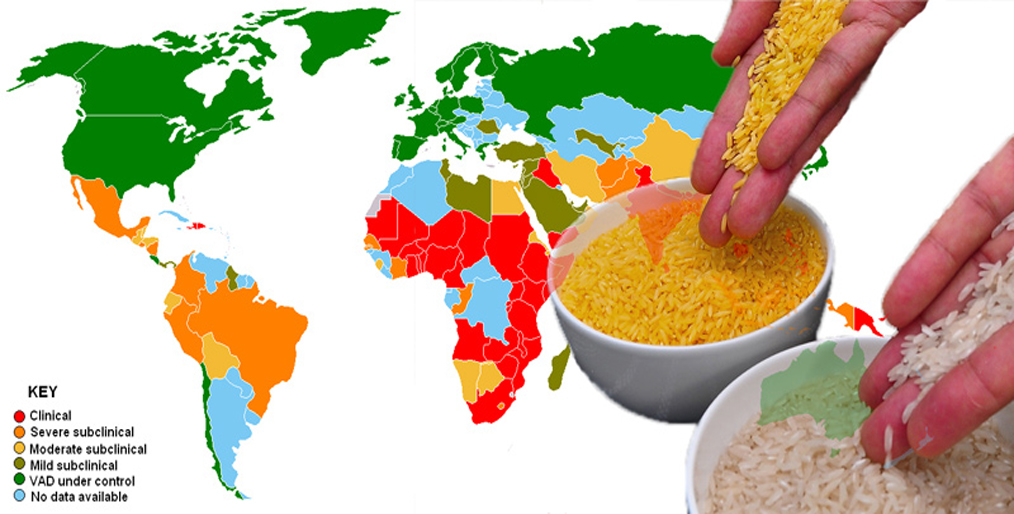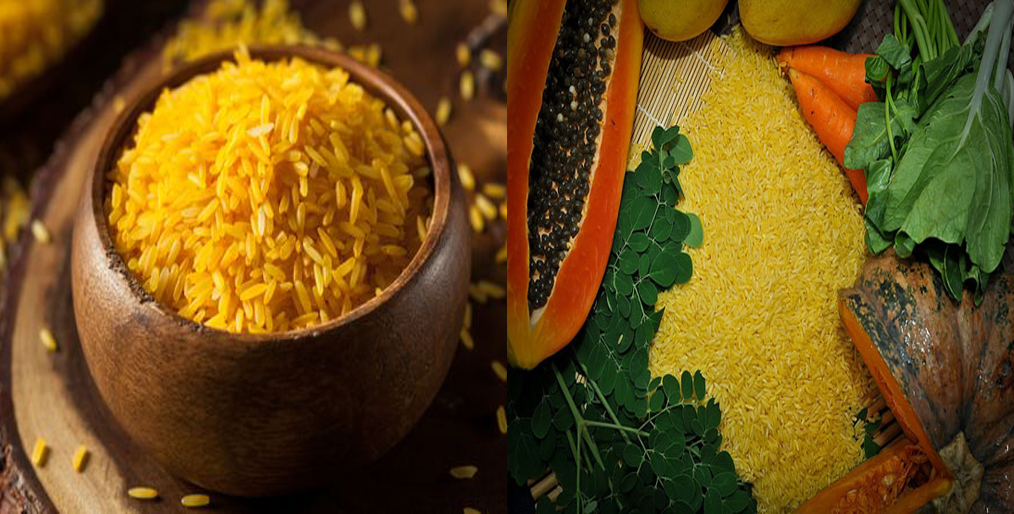
[caption id="attachment_2818" align="aligncenter" width="1014"] File Photo[/caption]
Bangladesh is set to decide on the release of golden rice varieties in the world's first vitamin A enriched rice by coming November 15.
Visiting Nobel Laureate Sir Richard John Roberts made the announcement at a regional seminar in Dhaka after he held an impromptu meeting with the ministers of agriculture and environment on October 27, 2019 Sunday.
Vitamin A enriched rice, popularly known as Golden Rice, has been in the regulatory approval process since November 2017 and the Ministry of Agriculture has long been pushing the Environment Ministry for its seal of approval.
Research on golden rice began in the 1990s as an effort to develop a type of rice that could counter malnutrition. The rice is fortified with beta-carotene, which is converted into vitamin A inside the body, and also gives the strain of rice it its color. Because the genetically modified rice is enhanced with micronutrients, it holds the potential to combat the critical vitamin A deficiency in Bangladesh.
Golden Rice is rich with beta carotene, also known as pro-vitamin A, a substance human bodies can convert to Vitamin A. Both Bangladesh and the Philippines have readied for release of the world’s first Vitamin-A enriched rice varieties, heralding a new era in the fight against Vitamin A deficiency (VAD).
[caption id="attachment_2820" align="aligncenter" width="1014"]
File Photo[/caption]
Bangladesh is set to decide on the release of golden rice varieties in the world's first vitamin A enriched rice by coming November 15.
Visiting Nobel Laureate Sir Richard John Roberts made the announcement at a regional seminar in Dhaka after he held an impromptu meeting with the ministers of agriculture and environment on October 27, 2019 Sunday.
Vitamin A enriched rice, popularly known as Golden Rice, has been in the regulatory approval process since November 2017 and the Ministry of Agriculture has long been pushing the Environment Ministry for its seal of approval.
Research on golden rice began in the 1990s as an effort to develop a type of rice that could counter malnutrition. The rice is fortified with beta-carotene, which is converted into vitamin A inside the body, and also gives the strain of rice it its color. Because the genetically modified rice is enhanced with micronutrients, it holds the potential to combat the critical vitamin A deficiency in Bangladesh.
Golden Rice is rich with beta carotene, also known as pro-vitamin A, a substance human bodies can convert to Vitamin A. Both Bangladesh and the Philippines have readied for release of the world’s first Vitamin-A enriched rice varieties, heralding a new era in the fight against Vitamin A deficiency (VAD).
[caption id="attachment_2820" align="aligncenter" width="1014"] File Photo[/caption]
According to the World Health Organization's global VAD database, one in every five pre-school children in Bangladesh is vitamin A-deficient. Among pregnant women, 23.7% suffer from VAD.
The International Rice Research Institute (IRRI) says VAD is the main cause of preventable blindness in children, and globally, some 6.7 million children die every year and another 350,000 go blind because they are vitamin A deficient. Once released, Golden Rice will be the culmination of a long-touted partial remedy for VAD.
Widespread adoption of golden rice would be incredibly valuable for Bangladesh. Not only is the rice fortified with beta-carotene, it also has higher crop yields than many other varieties. So benefits from its cultivation would arise both from increased farmer productivity as well the positive health effects. Furthermore, golden rice is a Boro rice, so the geographic areas where it is most likely to succeed in the field overlap considerably with the areas where nutrition deficiencies are highest in Bangladesh.
The costs to release golden rice for cultivation by 2018 include funding for research and development to continue to adapt it to the Bangladesh environment. It would also require paying costs for crop trials, extension services, seeds, marketing, and education. In total, the costs would be more than Tk 800 million (Tk 80 crore).
The analysis estimates that if 30 percent of the population would adopt golden rice as part of their regular diet, it would reduce vitamin A deficiency nationwide by roughly 30 percent. It would also decrease stunting by 3 percent, preventing approximately 165,000 children from becoming stunted. When added together, the value of these health benefits is more than Tk 175 billion (Tk 17,500 crore).
[caption id="attachment_2821" align="aligncenter" width="1014"]
File Photo[/caption]
According to the World Health Organization's global VAD database, one in every five pre-school children in Bangladesh is vitamin A-deficient. Among pregnant women, 23.7% suffer from VAD.
The International Rice Research Institute (IRRI) says VAD is the main cause of preventable blindness in children, and globally, some 6.7 million children die every year and another 350,000 go blind because they are vitamin A deficient. Once released, Golden Rice will be the culmination of a long-touted partial remedy for VAD.
Widespread adoption of golden rice would be incredibly valuable for Bangladesh. Not only is the rice fortified with beta-carotene, it also has higher crop yields than many other varieties. So benefits from its cultivation would arise both from increased farmer productivity as well the positive health effects. Furthermore, golden rice is a Boro rice, so the geographic areas where it is most likely to succeed in the field overlap considerably with the areas where nutrition deficiencies are highest in Bangladesh.
The costs to release golden rice for cultivation by 2018 include funding for research and development to continue to adapt it to the Bangladesh environment. It would also require paying costs for crop trials, extension services, seeds, marketing, and education. In total, the costs would be more than Tk 800 million (Tk 80 crore).
The analysis estimates that if 30 percent of the population would adopt golden rice as part of their regular diet, it would reduce vitamin A deficiency nationwide by roughly 30 percent. It would also decrease stunting by 3 percent, preventing approximately 165,000 children from becoming stunted. When added together, the value of these health benefits is more than Tk 175 billion (Tk 17,500 crore).
[caption id="attachment_2821" align="aligncenter" width="1014"] File Photo[/caption]
In addition, the 10 percent increase in rice yields would benefit farmers by nearly Tk 163 billion (Tk 16,300 crore). Overall, the health and productivity benefits combined would equal more than Tk 338 billion (Tk 33,800 crore). Each taka spent toward adoption of golden rice in Bangladesh would do a huge 416 takas in benefits.
Coming to Dhaka to deliver a keynote speech at a ‘Regional Seminar on GMO Crops: Policy and Practices in South Asia’ at North-South University on October 27, 2019, the 1993 Medicine Nobel winner Sir Richard Roberts enquired about the Golden Rice release development with the organizers. That immediately prompted Agriculture Minister Dr Mohammad Abdur Razzaque, who was also present at the seminar, to call up his cabinet colleague Environment Minister Md Shahab Uddin and set up an impromptu meeting.
Several hours later, as Sir Richard Roberts returned to the seminar venue after holding his meeting with the ministers, he spoke at the concluding session and informed that a final decision on Golden Rice will be taken by November 15.
“If Golden Rice is approved here (in Bangladesh) that will be a big message for the whole world, where 3,000 children die each day owing to VAD,” said the English biochemist and molecular biologist credited for developing the mechanism of gene splicing, an important source of protein diversity.
Source: Dhaka Tribune & COPENHAGEN CONSENSUS CENTER
SZK
File Photo[/caption]
In addition, the 10 percent increase in rice yields would benefit farmers by nearly Tk 163 billion (Tk 16,300 crore). Overall, the health and productivity benefits combined would equal more than Tk 338 billion (Tk 33,800 crore). Each taka spent toward adoption of golden rice in Bangladesh would do a huge 416 takas in benefits.
Coming to Dhaka to deliver a keynote speech at a ‘Regional Seminar on GMO Crops: Policy and Practices in South Asia’ at North-South University on October 27, 2019, the 1993 Medicine Nobel winner Sir Richard Roberts enquired about the Golden Rice release development with the organizers. That immediately prompted Agriculture Minister Dr Mohammad Abdur Razzaque, who was also present at the seminar, to call up his cabinet colleague Environment Minister Md Shahab Uddin and set up an impromptu meeting.
Several hours later, as Sir Richard Roberts returned to the seminar venue after holding his meeting with the ministers, he spoke at the concluding session and informed that a final decision on Golden Rice will be taken by November 15.
“If Golden Rice is approved here (in Bangladesh) that will be a big message for the whole world, where 3,000 children die each day owing to VAD,” said the English biochemist and molecular biologist credited for developing the mechanism of gene splicing, an important source of protein diversity.
Source: Dhaka Tribune & COPENHAGEN CONSENSUS CENTER
SZK
Comment Now